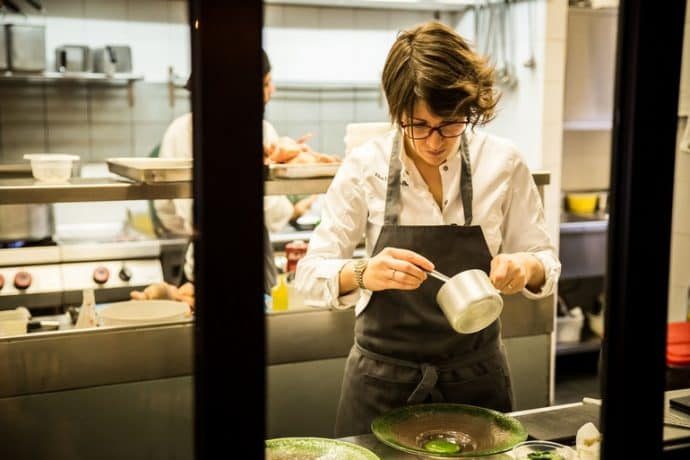Born in Alicante, Spain, Chef Alba Esteve Ruiz is the the culinary mastermind behind the success of renowned restaurant Marzapane in Rome. She began her professional career at Girona’s El Celler de Can Roca (which holds 3-Michelin stars and has been deemed Best Restaurant in the World by magazine Restaurant) and later moved to the Eternal City at the tender age of 19. In 2014, she won Gambero Rosso’s Best Emerging Chef award for her work at Marzapane. Romeing sat down with Chef Ruiz to talk about life as an expat, why a vacation is essential to her cooking, and the one dish she can’t live without.
Let’s start from the beginning. When and why did you decide to become a chef?
I’ve loved to cook since I was a little kid. I used to help my grandmother prepare lunch and family dinners, and I even had an apron just for me. Then when I was 15, I enrolled at a hospitality school in Valencia.
You were a teenager when you decided to leave Spain for Rome. Why did you decide to continue your culinary education in Rome instead of your home country?
I came to Italy to try a new type of cuisine, to experience new things, and also because I adored the language. Then I met Michel, my husband, and partner in life and work, and I decided to stay in Rome.
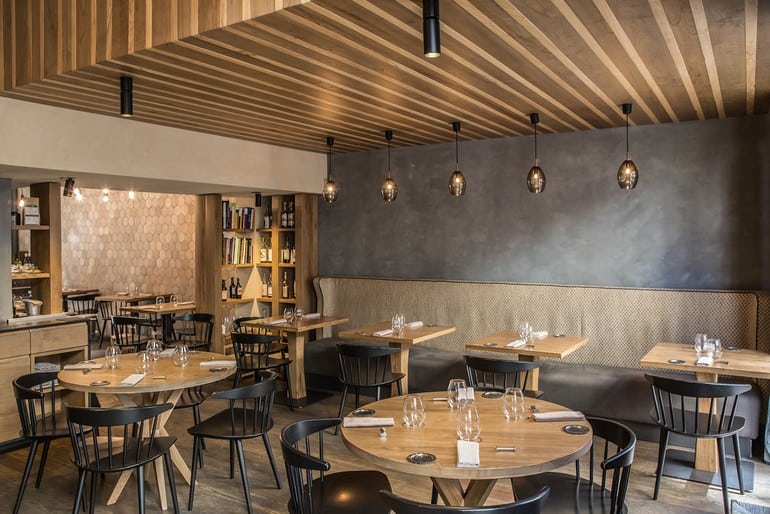
Tell us about Marzapane. Where does the name of the restaurant come from? What is the restaurant’s philosophy?
The name derives from the fact that both of the restaurant’s owners (Mario Sansone and Angelo Parello) are Sicilian. Initially Marzapane was a bistrot, and we were open from morning until 8pm, so for breakfast, then lunch, tea in the afternoons, and dinner in the evenings. Shortly after, we decided to concentrate only on lunch and dinner, and within a year we had become a restaurant. Our mission is to propose original dishes and attentive service, with a young team of chefs who aren’t afraid to challenge themselves and learn.
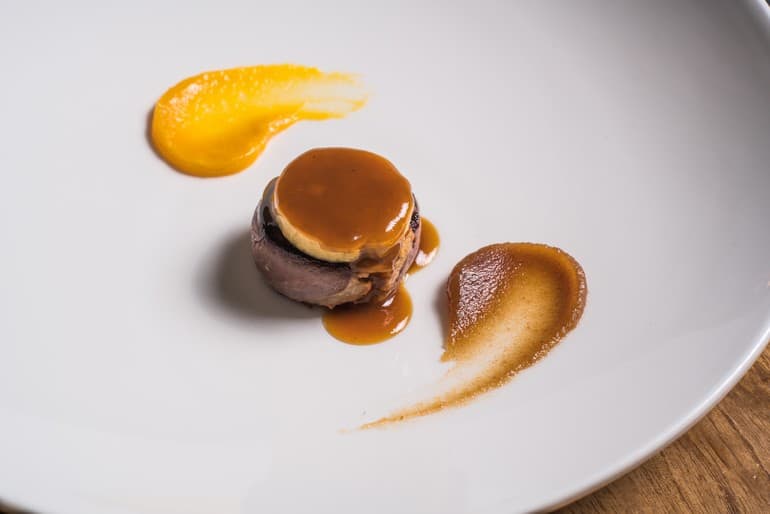
Where does the inspiration for the dishes on your menu come from? Do ideas just come spontaneously in a “lightbulb” moment or does it take months to develop a recipe?
The dishes on my menu follow, before anything else, the seasons. I change and tweak my menu based on which ingredients are the freshest. Usually, inspiration comes after a vacation, when I’m at my most relaxed. It’s extremely rare to come up with a great dish in moments of stress. To conceptualize a dish you need time, not to create it, but to do test-runs and perfect it. The most challenging part is finding those moments when I have free time and I’m in the right mood to invent.
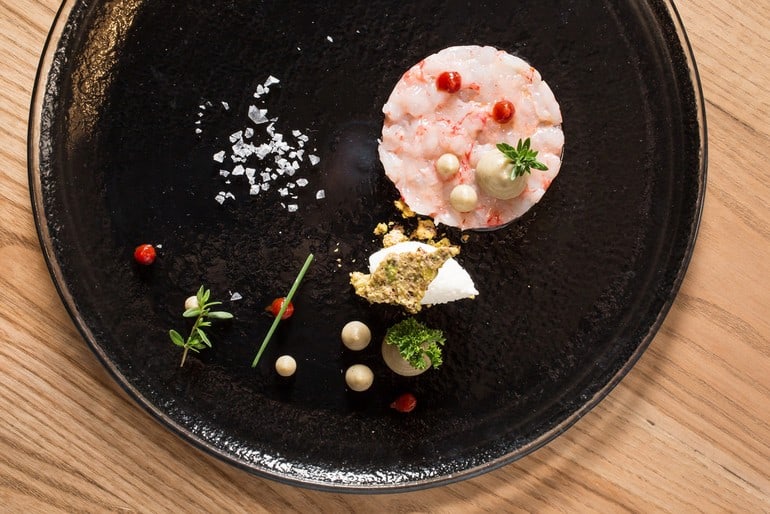
Which is the most requested dish at Marzapane? Which do you enjoy preparing the most?
The two most popular dishes at Marzapane are the battuta of red shrimp, burrata, smoked aubergine cream, candied tomato mustard, and pistachio brut ma bon biscuit; and risotto with butter, anchovies from the Cantabrian Sea, and candied ginger.
I always look forward to preparing and debuting a brand-new dish. When regular clients and friends dine at the restaurant, it’s always fun to give them something they’ve never tried before.
Who has influenced your cooking style the most?
Without a doubt, there’s a strong tie between my style and Spain. Maybe it’s because of homesickness, but many of my dishes reflect my native country, sometimes without me even realizing it. However, Italy has also influenced me – I love to eat and cook pasta, perhaps because it doesn’t belong to my own culinary traditions. It is incredibly versatile,
and I just adore it.
Which Italian dish can you not live without? Which Spanish dish?
My favorite Italian dish is pizza. I eat it often, sometimes even five times a week. After lunch service in the afternoon, I typically get pizza for a snack at a place right behind the restaurant. My favorite Spanish dish, meanwhile, is paella – every time I’m in Spain I have to have it.
Being a professional chef is often a male-dominated field. Have you found any challenges along the way of being a young, female chef? What is the advice you’d give to little girls who want to grow up and be chefs?
It’s true that this environment is mainly composed of men, but when it comes to potential obstacles, I’ve always acted as if there weren’t any. I don’t like feeling different, therefore I haven’t had any issues with my colleagues.
Tell us about Caffè dell’Opera at the Teatro dell’Opera.
Caffè dell’Opera is a project that still needs to be fully developed, but certainly has a simpler and more informal menu. In the summer we opened a pop-up kitchen with raw dishes and streamlined ideas. Now, we’re in charge of the food service during the shows at Teatro Costanzi. We’re only open before, during, and after performances. We’ve thought of a menu with hot and cold dishes to order during intermission. Before the show begins, you place your order at the register – at intermission, you pick up your dish. We propose fare you wouldn’t normally find at the theater.
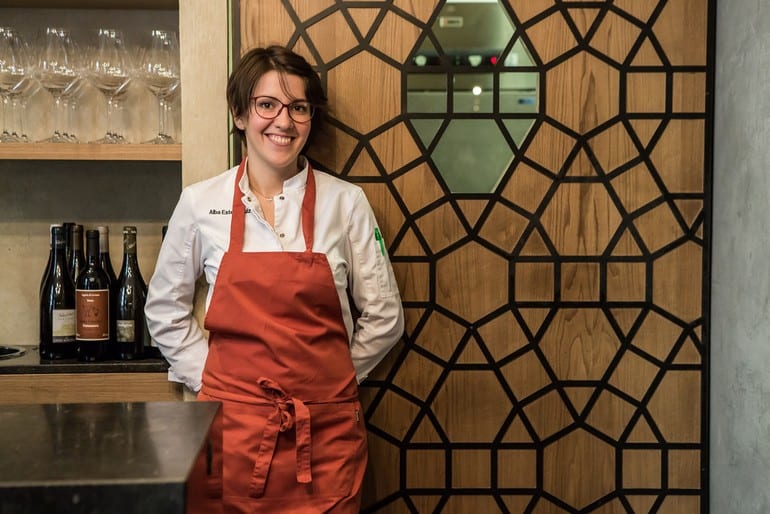
What was one of the biggest challenges in changing country and becoming an expat?
70% of chefs are foreigners. Rome is a welcoming city, full of people from all over the world. In fact, in the Marzapane kitchen there are only two Romans! The rest are all Italians that have moved to the capital. Even if you’re not from Rome, you never feel excluded or alone.
What is your relationship with Rome like?
I like it more than I used to. Rome is a big city and can take some getting used to. I live very close to the restaurant now, which means I usually just hang out in my neighborhood.
Besides Marzapane, what are your favorite restaurants in Rome?
Hands down Imàgo for its fresh, out of this world fish. Mercato Centrale in Termini Station also has many options – on the top floor there’s an Oliver Glowig restaurant, and the bottom floor offers a wealth of dishes and products from fantastic vendors.
Let’s say you have the entire day free in Rome. What would you do and where would you go?
I would wake up late, and have lunch at home. Then I’d go out to get chores done that I normally wouldn’t have any time for during the week. I’d get an aperitivo with my husband, see a show at the theater, and then have dinner. Or, I’d share a meal with my staff.
What is your advice for newly arrived expats in Rome?
Everyone has to learn on their own how to live in this city. Each expat is different!
What is your favorite part of the city? Why?
It’s a toss-up between Trastevere and Campo de’ Fiori. Both are beautiful, frenetic, enchanting, and charming all at once.
Is there anything you miss about Alicante when you are in Rome? And what do you miss about Rome when you are away too long?
I miss my family more than I miss the city of Alicante. When I’m away from Rome, I miss my job the most!
If you weren’t a chef, what would you be?
I can’t imagine doing anything else!


